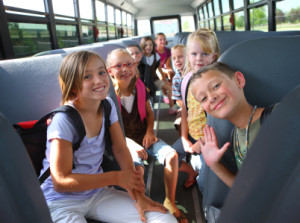
These are the days of tight resources and tighter schedules, and field trips are sometimes seen as a distraction from education. Excited children pile into buses with teachers and volunteers, removing valuable resources from school budgets and infringing on important instructional time.
Field trips are increasingly cut from school calendars. A 2010 survey of the American Association of School Administrators found that 50 percent of schools did not plan field trips for the following year.
New research shows that eliminating field trips may be to students’ detriment. Field trips provide important instructional advantages that prove a significant payoff. Education Next, a journal on school reform that seeks to publish data-supported research on school change, recently published a summary piece of research by University of Arkansas professor Jay Greene, who heads the school’s Department of Education Reform.
The benefits of an art museum field trip
For the study, classes from kindergarten through high school took a half-day field trip to the Crystal Bridges Museum of American Art in Bentonville, Arkansas. Students received a one-hour guided tour through the museum focusing on specific paintings followed by an opportunity to freely explore the museum. Afterwards, a block of students were given a survey and a small essay assignment. This group included both a control group that had not attended a field trip and the field trip attendees. The findings of the study were important in outlining the usefulness of field trips overall.
The Crystal Bridges Museum of American Art’s healthy endowment allowed for complete funding of school field trips, creating a broad research base for Greene to examine. He looked for specific outcomes from field trips, related to tour detail recall, critical thinking, historical empathy, tolerance, and interest in museums. Greene also examined results from disadvantaged populations to see whether they enjoyed a unique benefit.
Interesting results found
Students who attended the tour had significant detail recall, which Greene notes could be an excellent means to teach them content if tours coincided with required student content knowledge. He concludes that this high rate of content recall is notable, though the control group comparison provides little insight because those students were not given access to the knowledge tested through the survey. Still, further study of the impressive rate at which students recalled content may prove the significant power of hands-on activity in cementing student content knowledge.
Three key measures of the study were critical thinking, historical empathy, and tolerance, and all three found positive correlations between the museum trip and increased gains in these categories. Greene noted that the critical thinking gains should inspire future study, as students illustrated positive gains in observational skills in art analysis, but future research should focus on the translatability of those skills to other key critical thinking behaviors. Historical empathy and tolerance both showed notable increases, with the field trip population more likely to both understand how early Americans felt during their varying time periods and to support an artist’s right to free expression.
Administrators: Consider before eliminating field trips
Two of the most notable findings of Greene’s research were the student likelihood to return to the museum experience and the gains made by disadvantaged students. Students were given a coded coupon to come to the museum. Those who attended a field trip were more likely to return to the museum, share their museum experience with their friends, and to view the experience positively.
Additionally, Greene notes that, “One consistent pattern in our results is that the benefits of a school tour are generally much larger for students from less-advantaged backgrounds.” He goes on to note that the younger the student populations are, the greater the gains as well.
Greene finishes his piece by covering the important policy takeaways from his research, namely that school enrichment field trips have “notable benefits,” and that policy makers, administrations, and philanthropists should all consider the implications of his study. Enrichment field trips should not be abandoned or replaced with reward trips. Most importantly, we should remember that the children who benefit most from enrichment field trips are often the least likely to get them.
Monica Fuglei is a graduate of the University of Nebraska in Omaha and a current adjunct faculty member of Arapahoe Community College in Colorado, where she teaches composition and creative writing.
Categorized as: Tips for Teachers and Classroom Resources
